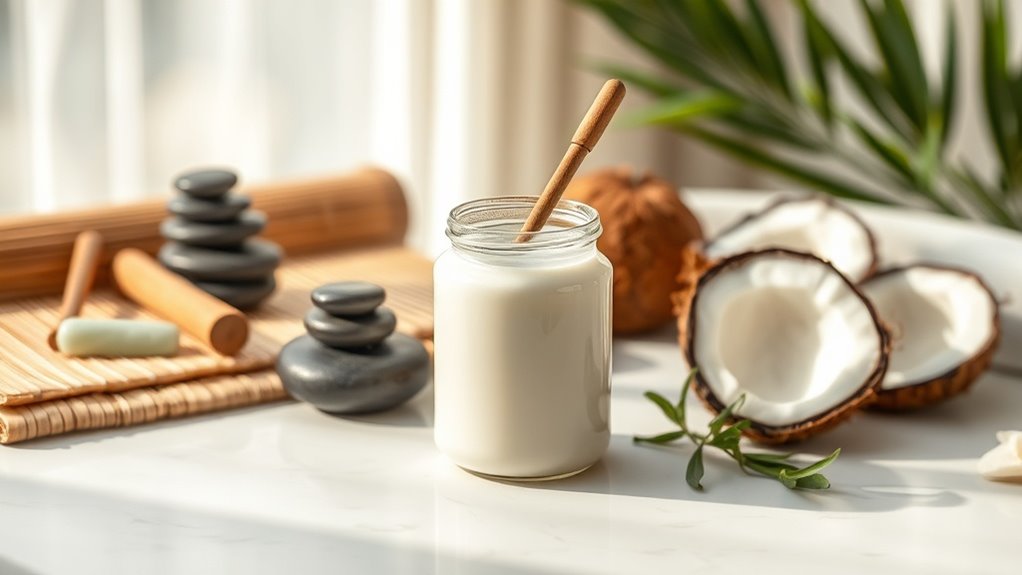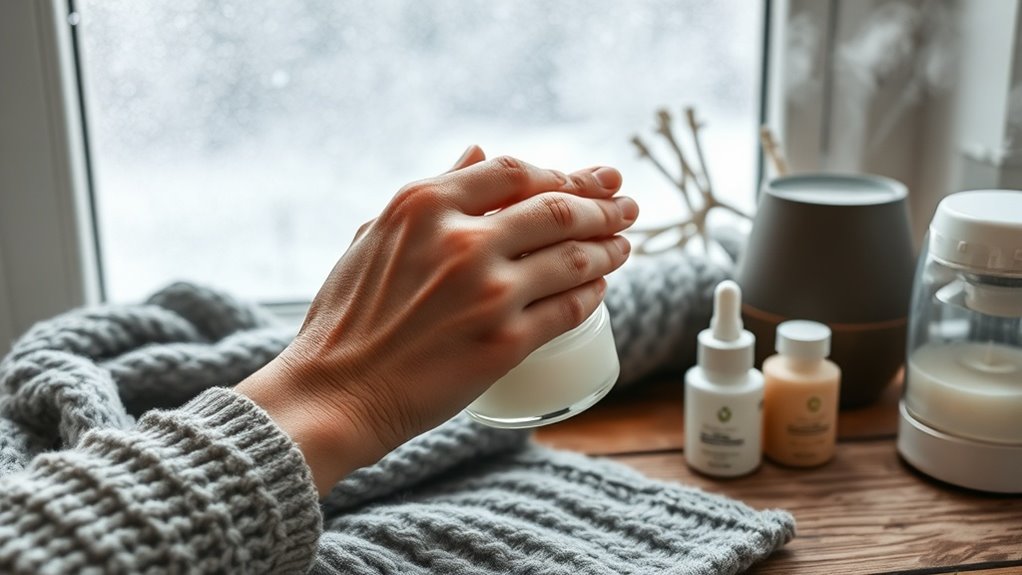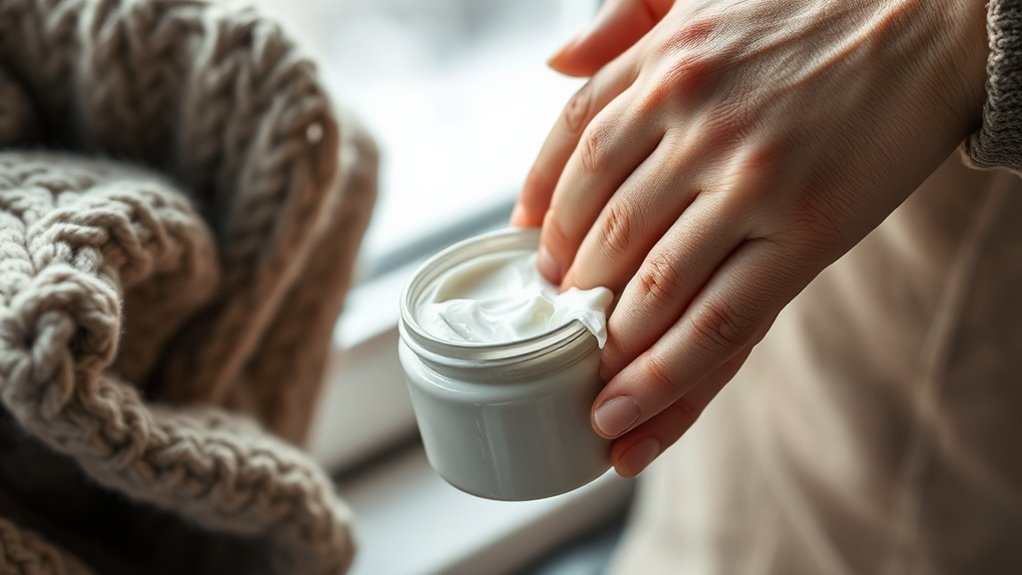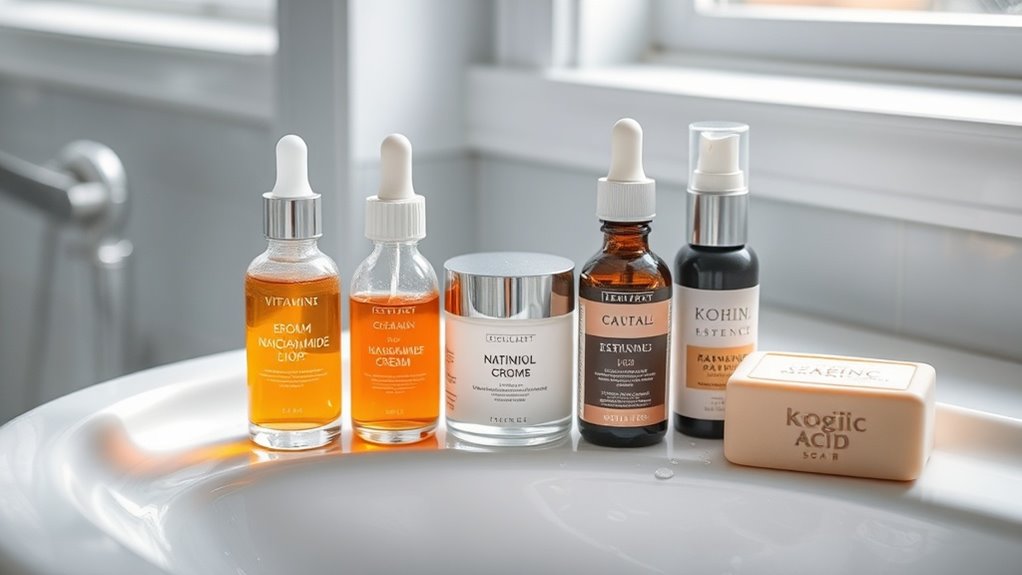My Go-To Remedies for Allergy Season Survival
You can effectively manage seasonal allergies through a combination of natural supplements and proven strategies. Start by taking quercetin and vitamin C to block histamine release, while using HEPA air purifiers at home to remove 99.97% of airborne particles. Incorporate anti-inflammatory foods, local raw honey, and maintain strict indoor cleaning routines. Consider OTC antihistamines when needed, and track local pollen counts to plan outdoor activities. Understanding your specific triggers and building a comprehensive defense system will maximize your relief potential.
Understanding Common Seasonal Allergies and Their Triggers
When pollen and other allergens fill the air, millions of people experience seasonal allergies, also known as allergic rhinitis or hay fever.
Your immune system reacts to these airborne particles by releasing histamine, triggering symptoms like sneezing, congestion, and itchy eyes. Common triggers include tree pollen in spring, grass pollen in summer, and weed pollen in fall, particularly ragweed.
Before pursuing allergy remedies, it’s crucial to identify your specific triggers through seasonal patterns and allergy testing.
Indoor allergens like dust mites and pet dander can also compound your seasonal symptoms, making year-round awareness essential for effective management.
In early spring, tree pollen species like maple, elm, and juniper are particularly problematic for allergy sufferers.
Essential Natural Supplements for Allergy Relief
Nature’s medicine cabinet offers several evidence-based supplements that can help alleviate seasonal allergy symptoms.
Quercetin, a flavonoid found in onions and apples, stabilizes mast cells and reduces histamine release. You’ll find butterbur effective for nasal congestion, comparable to antihistamine medications. Vitamin C acts as a natural antihistamine while strengthening your immune system.
Stinging nettle leaf extract can block histamine receptors and reduce inflammation.
Consider supplementing with vitamin D3, as deficiency correlates with increased allergy severity. For optimal results, you should start taking these supplements two weeks before allergy season begins and maintain consistent daily dosing.
Bromelain enzyme supplements derived from pineapples can help reduce nasal swelling and thin mucus secretions.
Powerful Over-the-Counter Medications That Work
When battling seasonal allergies, you’ll find significant relief through three primary types of over-the-counter medications: antihistamines in both pill and nasal spray forms, specialized eye drops containing antihistamines or mast cell stabilizers, and targeted decongestants that reduce nasal inflammation.
Your first line of defense should include long-acting antihistamines like cetirizine or fexofenadine, which block histamine receptors for up to 24 hours with minimal drowsiness.
For severe symptoms, you can maximize relief by combining these treatments strategically – using oral antihistamines with decongestant nasal sprays and adding allergy eye drops that contain ketotifen or olopatadine for itchy, watery eyes.
Antihistamine Pills and Sprays
Over-the-counter antihistamines represent the first line of defense against seasonal allergies, with both oral medications and nasal sprays offering rapid symptom relief.
You’ll find two main types of oral antihistamines: first-generation (like diphenhydramine) and second-generation (like cetirizine, loratadine, and fexofenadine). Second-generation options won’t make you drowsy.
Nasal antihistamine sprays, such as azelastine, target inflammation directly in your nasal passages. They work within 15 minutes to block histamine receptors, reducing sneezing, itching, and congestion.
For optimal results, you can safely combine oral antihistamines with nasal sprays under your doctor’s guidance.
Best Allergy Eye Drops
Itchy, irritated eyes demand specialized treatment beyond standard oral antihistamines. The most effective over-the-counter eye drops contain either ketotifen or olopatadine, both potent mast cell stabilizers that prevent histamine release.
You’ll find rapid relief with ketotifen-based options like Zaditor or Alaway, which work within minutes and last up to 12 hours.
For severe symptoms, olopatadine drops such as Pataday provide powerful dual-action relief through antihistamine and anti-inflammatory properties.
Choose preservative-free formulations if you’re using drops frequently, and don’t combine different eye drop medications without consulting your doctor.
Apply them 10 minutes apart if multiple types are needed.
Decongestant Relief Methods
Nasal decongestants offer rapid relief from sinus pressure and congestion through two primary mechanisms: oral medications containing pseudoephedrine (like Sudafed) constrict blood vessels systemically, while topical sprays with oxymetazoline (such as Afrin) work directly on nasal passages.
You’ll find phenylephrine-based decongestants readily available on store shelves, though they’re less effective than pseudoephedrine products kept behind the pharmacy counter.
When using nasal sprays, don’t exceed three consecutive days of use to avoid rebound congestion. For maximum effectiveness, combine decongestants with antihistamines like loratadine or cetirizine – but check with your doctor first, especially if you have heart conditions or high blood pressure.
Creating an Allergy-Proof Home Environment
While outdoor allergens can be difficult to control, transforming your home into an allergy-resistant sanctuary is both achievable and scientifically proven to reduce symptoms.
Install HEPA air purifiers in bedrooms and living spaces to filter out 99.97% of airborne particles.
Maintain indoor humidity between 30-50% using dehumidifiers to prevent mold growth.
Vacuum carpets twice weekly with a HEPA-filtered vacuum, and replace your HVAC filters monthly.
Consider removing carpeting in favor of hardwood or tile flooring.
Wash bedding weekly in hot water (130°F) to eliminate dust mites and pet dander.
Incorporating face-to-face counseling with healthcare providers can help develop a personalized plan for managing indoor allergen exposure.
Diet Changes That Help Reduce Allergy Symptoms
Your dietary choices can significantly influence allergy symptoms through their effects on inflammation and immune system response.
Research shows that incorporating anti-inflammatory foods like omega-3-rich fish, turmeric, and quercetin-containing fruits while limiting dairy products, which can increase mucus production, helps reduce allergy severity.
Natural histamine blockers found in foods such as stinging nettle, citrus fruits, and bromelain-rich pineapple work alongside your body’s immune defenses to minimize seasonal allergy reactions.
Anti-Inflammatory Foods Matter
Making strategic changes to your diet can significantly reduce allergy symptoms through the power of anti-inflammatory foods. Research shows that consuming specific nutrients can help modulate your immune response and decrease inflammation in your airways.
| Food Type | Anti-Inflammatory Benefits |
|---|---|
| Fatty Fish | Omega-3s reduce cytokines |
| Berries | Quercetin blocks histamine |
| Turmeric | Curcumin fights inflammation |
| Green Tea | EGCG compounds soothe airways |
| Ginger | Gingerols suppress allergic response |
You’ll find these foods most effective when consumed regularly throughout allergy season. Studies indicate that combining multiple anti-inflammatory foods creates a synergistic effect, enhancing your body’s natural defense against allergens.
Dairy’s Impact on Allergies
Beyond anti-inflammatory foods, dairy consumption plays a significant role in allergy symptom management. Studies show that dairy products can increase mucus production and thickness, potentially worsening nasal congestion and respiratory symptoms during allergy season.
You’ll want to reduce your intake of milk, cheese, and yogurt when pollen counts are high.
Instead, opt for plant-based alternatives like almond, oat, or coconut milk. These won’t trigger excess mucus formation and may help decrease inflammation.
If you’re not ready to eliminate dairy completely, try cutting back by 50% during peak allergy periods to observe how your body responds.
Best Natural Histamine Blockers
While antihistamine medications are commonly prescribed for allergy relief, several natural compounds can effectively block histamine production and reduce allergy symptoms.
You’ll find quercetin in onions, apples, and berries, which stabilizes mast cells and prevents histamine release.
Vitamin C acts as a natural antihistamine, while bromelain, found in pineapple, helps reduce nasal swelling.
Incorporate stinging nettle into your diet through tea or supplements, as it contains compounds that block histamine receptors.
Adding turmeric to meals provides curcumin, which reduces inflammation and allergic responses.
Herbal Teas and Home Remedies Worth Trying
Since nature provides numerous compounds with antihistamine and anti-inflammatory properties, several herbal teas and home remedies can effectively alleviate allergy symptoms.
You’ll find relief with nettle tea, which contains natural antihistamines and reduces inflammation.
Butterbur tea demonstrates effectiveness comparable to conventional antihistamines without drowsiness.
Try ginger tea to decrease nasal congestion and throat irritation through its anti-inflammatory compounds.
For immediate relief, you can inhale steam infused with eucalyptus or peppermint essential oils.
Local raw honey may help build immunity to regional allergens when consumed regularly.
Quercetin-rich green tea reduces histamine release and soothes irritated airways.
Consuming 1-2 teaspoons of honey daily can help strengthen your immune response to local pollen.
Simple Daily Habits to Minimize Exposure
To minimize allergy exposure during peak seasons, implementing several key daily habits can significantly reduce your contact with airborne allergens.
Keep windows closed during high pollen hours (5-10 AM), remove shoes before entering your home, and shower immediately after outdoor activities.
You’ll want to wash bedding weekly in hot water, use HEPA air purifiers, and regularly clean or replace HVAC filters.
Track local pollen counts and plan outdoor activities accordingly.
Don’t dry clothes outside, as pollen clings to fabric. Wear sunglasses outdoors to protect your eyes, and consider using a face mask during yard work.
Effective Air Purification Methods
Because airborne allergens can be as small as 0.3 microns, effective air purification requires a multi-layered approach using proven filtration technologies.
You’ll need a HEPA filter that captures 99.97% of particles, combined with activated carbon to absorb odors and chemicals. Consider incorporating UV-C light technology to neutralize airborne pathogens.
Position your air purifier in spaces where you spend the most time, particularly your bedroom. For optimal results, you’ll want to maintain proper air circulation by keeping doors closed and replacing filters according to manufacturer specifications.
Test your indoor air quality regularly using a particulate matter monitor to verify filtration efficiency.
Local Honey and Other Natural Immunity Boosters
You can strengthen your body’s natural defenses against seasonal allergies by consuming one tablespoon of raw, local honey daily, which contains trace amounts of local pollen that may help build immunity.
Supporting herbs like elderberry, echinacea, and astragalus have demonstrated immunomodulating properties in clinical studies, helping to regulate your immune system’s response to allergens.
When combined with local honey, these natural immune boosters work synergistically to reduce your sensitivity to seasonal triggers while providing antioxidant and anti-inflammatory benefits.
For optimal results, start your honey allergy regimen at least two months before allergy season begins.
Raw Honey Benefits Daily
While many people seek out pharmaceutical solutions for seasonal allergies, consuming raw local honey offers a scientifically-supported natural alternative.
You’ll find that taking 1-2 teaspoons of raw honey daily helps build immunity to local pollen, as bees collect and transfer these allergens into their honey. Studies suggest starting this regimen 2-3 months before allergy season.
For maximum benefits, you’ll want to ensure your honey’s truly raw and sourced within 50 miles of your location. The honey should appear cloudy and contain visible pollen particles.
Don’t heat it above 95°F, as this destroys the beneficial enzymes and pollen content.
Herbs For Immune Support
Beyond raw honey’s immune-boosting properties, several other natural herbs can strengthen your body’s defenses against seasonal allergies. Echinacea stimulates white blood cell production, while elderberry contains antioxidants that combat inflammation.
Astragalus root enhances your immune system’s ability to identify and neutralize allergens.
You’ll find powerful support in adaptogenic herbs like reishi mushroom and holy basil, which help regulate your body’s stress response during allergy attacks.
Nettle leaf reduces histamine production, and butterbur has demonstrated effectiveness comparable to conventional antihistamines in clinical studies.
Consider incorporating these herbs as teas, tinctures, or supplements during peak allergy seasons.
When to Seek Professional Medical Help
Although many allergy symptoms can be managed with over-the-counter medications, certain warning signs indicate the need for professional medical intervention.
You should seek immediate medical attention if you experience severe chest tightness, difficulty breathing, or wheezing.
Consult your healthcare provider if you’ve got persistent sinus infections, chronic coughing, or symptoms that don’t improve with standard treatments.
Watch for signs of anaphylaxis, including throat swelling, rapid pulse, and dizziness.
Additionally, schedule an appointment if your allergies significantly impact your daily activities, sleep patterns, or quality of life.
Your doctor can perform specific allergy testing and develop a targeted treatment plan.




